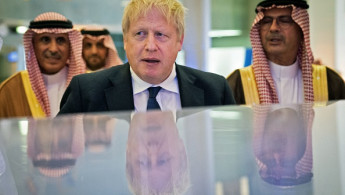UK's Boris Johnson returns with 'empty tank' from Riyadh oil price shopping trip
Boris Johnson has returned from Riyadh empty-handed, after travelling to meet with Crown Prince Mohammed Bin Salman in search of commitments to raise oil production.
The British prime minister’s trade visit to Saudi Arabia took place just four days after 81 people were executed in the kingdom, prompting outcry in UK's parliament.
Before landing in Riyadh, Johnson paid a visit to UAE Crown Prince Mohammed bin Zayed in Dubai. Both meetings failed to secure commitments from either oil-producing Gulf states to help end the West’s dependency on Russian oil.
When asked about the outcomes of his trip, Johnson told reporters on his return to the UK: "I think you’ll need to talk to the Saudis about that."
"I think there was an understanding of the need to ensure stability in global oil and gas markets and the need to avoid damaging price spikes," he continued.
However, both Gulf states have rebuked UK and US appeals to increase oil and gas production in order to quell rising energy prices globally.
Outcry over Saudi human rights abuses
Johnson's visit, which came after Saudi Arabia carried out a mass execution of 81 men, was met with outrage and dismay from across the UK political spectrum.
At a parliamentary debate on Monday, Conservative MP Crispin Blunt described the executions as "A new low for human rights and criminal justice in the kingdom, coming only a week after the Crown Prince had promised to modernise the Saudi justice system".
Zarah Sultana MP tweeted her outrage, saying "If the government really cared about human rights, it would end its cosy relationship with the Saudis."
During parliamentary questions, the Labour Party’s deputy leader Angela Rayner accused Johnson of going "cap in hand from one dictator to another" by asking Saudi Arabia to produce more oil.
The UK Prime Minister is one of only a handful of heads of state to make a formal visit to the Saudi kingdom since the murder of Saudi journalist Jamal Khashoggi in 2018.
The most recent high-profile visitor was French President Emmanuel Macron, who became the first G7 leader to touch down in Riyadh after the CIA said Prince Mohammed must have authorised the operation against Khashoggi.
And during Johnson’s visit, a further three executions were held in Riyadh. No mention of the executions were made by the Saudi Press Agency.
Nevertheless, the Prime Minister told reporters: "I think you can also see that in spite of that news you’ve referred to today, things are changing in Saudi Arabia, we want to see them continue to change."
Forty-one of those executed on Saturday were from Saudi Arabia's Shia minority and were convicted of charges such as "disrupting the social fabric and national cohesion" and "participating in and inciting sit-ins and protests".
It marked the latest demonstration of Saudi Arabia’s politicised use of the death penalty to silence dissent in the eastern province.
"Nobody should face a death sentence simply for practicing their right to free speech," Amnesty International's Lynn Maalouf. said in a statement.
"The state’s use of executions as a political tool to stifle critics is a rampant miscarriage of justice."





 Follow the Middle East's top stories in English at The New Arab on Google News
Follow the Middle East's top stories in English at The New Arab on Google News


